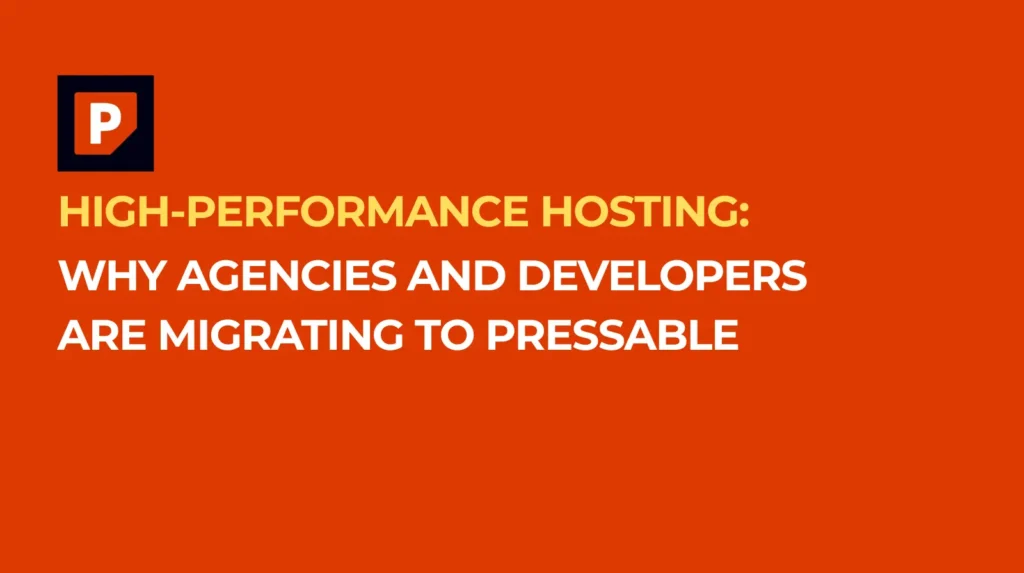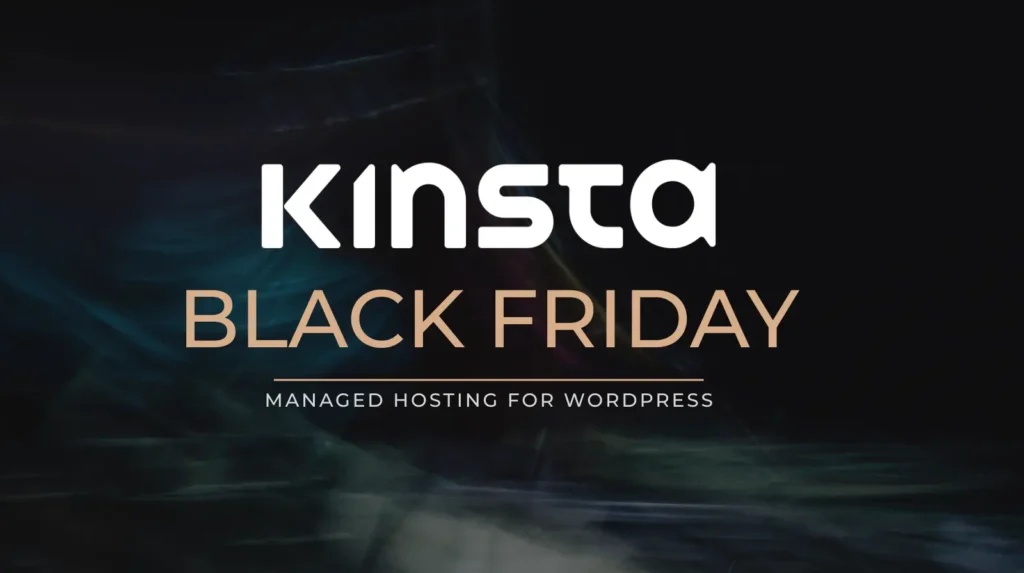It’s wild to think that just a few years ago, optimizing for Google’s ten blue links was the endgame.
Now? You’re optimizing for Google’s AI Overviews, ChatGPT, Perplexity, and whatever next-generation model launches tomorrow. This new paradigm is often called AI Engine Optimization (AEO) or Generative Engine Optimization (GEO).
For businesses, this shift opens up a massive new channel and a significant challenge. How do you know if your content is being used as a source by these AI systems? Are they referencing your brand accurately? And how do your “rankings” in AI-generated answers compare to competitors?
That’s where LLM tracking tools become essential. These platforms help you see how your content performs in the world of generative AI. They go beyond traditional SEO, providing insights into how Large Language Models (LLMs) surface your content, how users interact with AI-generated answers, and where you’re missing opportunities.
In this guide, we’ll break down the top LLM tracking tools of 2025, what they do, and how they help you stay visible in the age of AI search.
What Are LLM Tracking Tools?
LLM tracking tools are specialized software platforms designed to monitor how your content, keywords, brand, and competitors appear in AI-generated responses from models like OpenAI’s GPT-4o, Google’s Gemini, Anthropic’s Claude 3.5, and others.
Think of them as the Google Search Console for the AI world.
Instead of tracking your position in a list of links, they answer critical business questions:
- Is ChatGPT recommending my product when a user asks for the “best CRM for startups”?
- Does Claude cite my blog post when summarizing “how to write an effective cold email”?
- Is Google pulling answers from my site or my competitors’ for its AI Overviews?
Some tools go deeper, offering sentiment analysis, prompt-based tracking, and source attribution. This means you don’t just know if you’re mentioned, but also how and why.
Why LLM Monitoring is Crucial for Your Business
In short, LLMs are the new gatekeepers to information. According to a recent Gartner report, traditional search engine volume is projected to drop by 25% by 2026, with AI chatbots and other virtual agents taking its place.
Unlike traditional search, LLMs don’t always link back to your site. They summarize, rephrase, or synthesize information from multiple sources. Your content could be the basis for an answer, but you might never get the credit or the click.
LLM tracking tools solve this by giving you visibility into:
- Brand Representation: If an LLM gives a wrong or outdated answer about your brand, you need to catch and address it.
- Source Attribution: See if your content is being cited as an authoritative source, driving brand awareness.
- Competitive Intelligence: Understand which prompts and keywords your competitors are being cited for.
- Content Strategy: Identify what content formats and topics perform best in AI answers to inform your strategy.
Key Features to Look for in an LLM Tracking Tool
When choosing a tool, prioritize these core features to ensure you get actionable insights:
- Multi-Model Support: The AI ecosystem is fragmented. A great tool must track your visibility across multiple key models, including ChatGPT (GPT-4o), Claude 3.5, Gemini, Perplexity, and especially Google AI Overviews.
- Prompt & Keyword Monitoring: Prompts are the new keywords. The tool should allow you to track specific search queries and conversational prompts to see how they trigger mentions of your brand or content.
- Source & Citation Tracking: The best tools don’t just tell you if you were mentioned; they show you which specific URL was used as a source. This is the closest equivalent to a backlink in the AEO world.
- Sentiment Analysis: Understand the context of your mentions. Is the AI portraying your brand positively, negatively, or neutrally?
- Competitive Benchmarking: AEO isn’t just about being present; it’s about being more visible than your competitors. Look for features that allow side-by-side comparisons.
- Actionable Dashboards & Alerts: You need a clean interface with real-time data and automated alerts that notify you of significant changes in your AI visibility.
The Best LLM Tracking Tools of 2025
Here are our top picks for the best platforms to monitor your AI search performance.
1. SE Ranking
SE Ranking blends an SEO platform with a dedicated suite of LLM tracking tools. Its AI Results Tracker allows you to monitor where your brand appears across ChatGPT, Perplexity, Google’s AI Overviews, AI Mode, and Gemini.
With detailed insights into mentions, links, and competitive positions, SE Ranking helps you understand if, where, and how you and your competitors are cited in AI responses. It updates regularly, shows cached AI responses, and provides historical data. It’s a unified, intuitive platform that gives clear insights into AI-powered search optimization without added complexity.
![]()
Best For: SEO teams, agencies, and SMBs that want a comprehensive SEO platform with built-in AI search and LLM monitoring.
Pros:
- Tracks traditional search engines like Google, Bing, and Yahoo, and AI visibility across AIOs, AI Mode, Gemini, ChatGPT, and Perplexity.
- Includes cached copies of AI answers for context and clarity.
- Benchmarking against competitor visibility and placements.
- Provides the list of top-cited sources in AI answers.
- Regular updates with historical trends and volatility tracking.
Cons:
- Sentiment analysis is not available yet.
- Comes with higher pricing plans or as an add-on.
Pricing:
- Pro: $119/month for 50 prompts
- Business: $259/month for 100 prompts
- AI Search add-on: From $89/month for expanded checks and access to more features and competitor AI data
- Free 14-day trial is available
2. Nightwatch
You may know Nightwatch as a powerful, design-forward SEO rank tracker, but it has evolved to meet the demands of AI search. Its LLM tracking capabilities allow you to monitor keyword performance not just on Google and Bing, but also across AI models like ChatGPT (GPT-4o) and Claude 3.5 Sonnet.
This makes it one of the strongest hybrid tools, offering a side-by-side view of classic SERP rankings and AI-powered search visibility. For teams already invested in traditional SEO, Nightwatch provides a gentle learning curve and an integrated workflow.
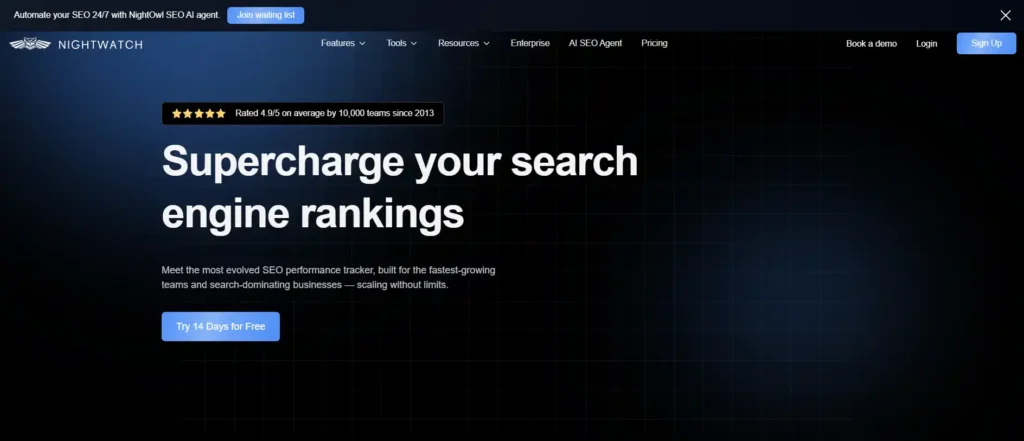
Best For: SEO professionals and agencies who want a single, powerful platform to track keyword rankings across both traditional search engines and major AI models.
Pros:
- Tracks both traditional SEO and AI visibility in one dashboard.
- Excellent for local AI results with precise location settings.
- Robust integration with Google Analytics, Google Search Console, and Looker Studio.
- Provides daily ranking updates and customizable reports.
- Includes a comprehensive site audit tool to identify technical SEO issues.
Cons:
- LLM tracking is a newer feature, and the range of supported models is still growing compared to some specialized tools.
- AI visibility metrics are still evolving and differ from traditional SEO KPIs.
Pricing:
- Startup: $32/month (billed annually) for 250 daily keywords.
- Optimize: $82/month (billed annually) for 1,000 daily keywords.
- Agency: $559/month (billed annually) for 10,000 daily keywords.
- A 14-day free trial is available.
3. Peec AI
Based in Berlin, Peec AI is one of the first platforms built exclusively to help brands monitor their representation across AI platforms like ChatGPT, Perplexity, and Google AI Overviews.
Instead of focusing on traditional rankings, Peec AI centers on brand visibility and narrative control. It scores your brand’s visibility, analyzes the sentiment of mentions, and reveals the sources AI models use when they talk about you. It’s a brand manager’s tool for the AI era.
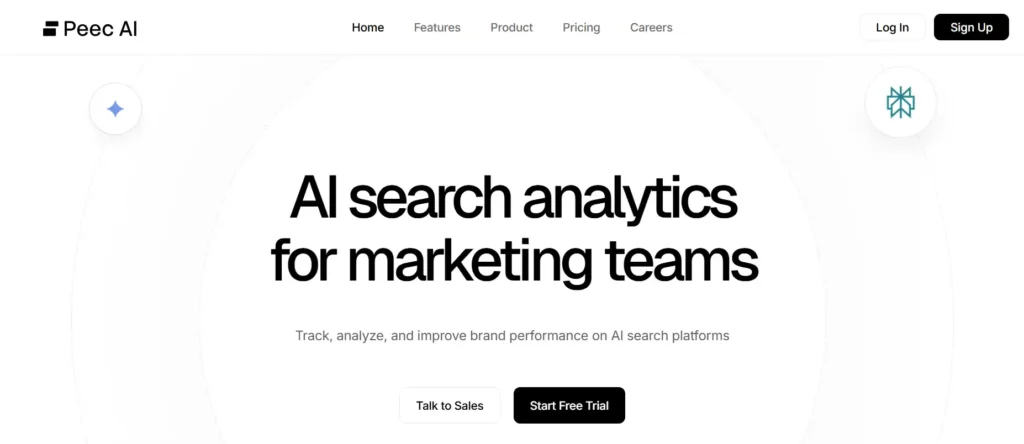
Best For: Marketing teams and brand managers focused on strategic positioning and reputation management within AI-generated search results.
Pros:
- Purpose-built for monitoring brand presence in AI search.
- Covers key conversational AI platforms.
- Analyzes brand sentiment and share of voice against competitors.
- Identifies the original sources AI models are citing.
- Daily tracking keeps you updated on any shifts in representation.
Cons:
- No free trial is publicly offered.
- As a newer, specialized tool, it lacks the broader SEO features of hybrid platforms.
- More expensive for the number of prompts tracked compared to some competitors.
Pricing:
- Starter: €89/month for 25 prompts.
- Pro: €199/month for 100 prompts.
- Enterprise: Starting at €499/month for 300+ prompts.
4. Profound
Profound is an enterprise-grade AEO platform designed for large organizations that need to track and shape their brand presence across top AI models, including ChatGPT, Claude, Gemini, Perplexity, Grok, and Google’s AI Overviews.
It goes beyond simple mention tracking to provide deep analysis of sentiment, source attribution, and competitive comparisons. Its “LLM-Ready” site audit feature helps diagnose technical issues preventing your content from being surfaced. With a developer-friendly API, Profound is built to integrate into enterprise-level marketing and data workflows.
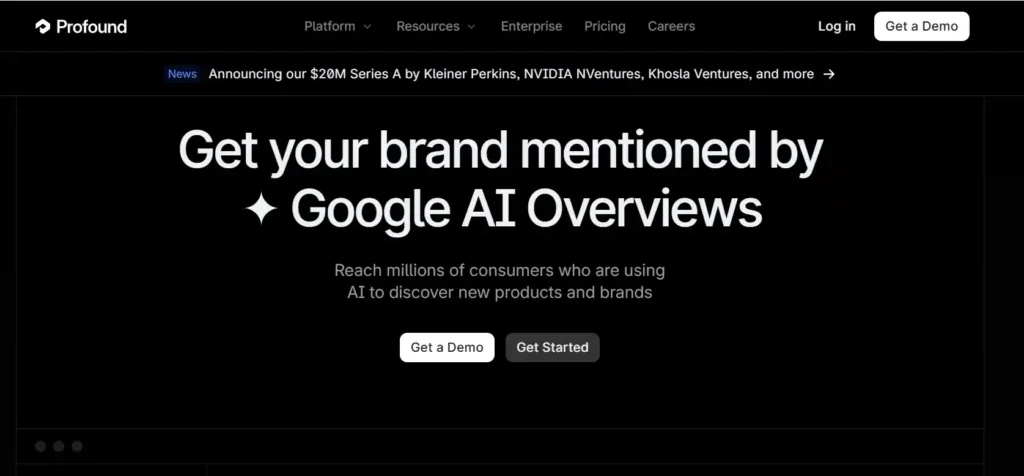
Best For: Large enterprises and data-driven marketing teams that require granular insights and API access to manage their brand’s perception across a wide array of AI platforms.
Pros:
- Extensive coverage of all major LLMs and AI search experiences.
- Advanced sentiment analysis tracks how brand perception changes over time.
- Powerful competitive intelligence features.
- Provides an “LLM-Ready” site audit to ensure your content is accessible to AI crawlers.
- Robust API for custom integrations.
Cons:
- Pricing is geared towards enterprise clients and may be prohibitive for smaller businesses.
- No free trial is available; requires a demo and custom quote.
- Can be overly complex for teams new to AEO.
Pricing:
- Profound Lite: Starts at $499/month for tracking one company.
- Enterprise: Custom pricing available upon request.
5. Keyword.com
Keyword.com, which evolved from the well-known Serpbook, is a veteran rank tracker that has successfully pivoted to the AI era. While it maintains its excellent traditional SERP tracking capabilities, its standout feature is now its comprehensive LLM tracking suite.
The platform allows you to monitor how your brand is cited across ChatGPT, Gemini, Claude, and Perplexity. It bridges the gap between your organic search strategy and your AEO efforts, showing you which keywords trigger AI citations and which of your URLs are being referenced.
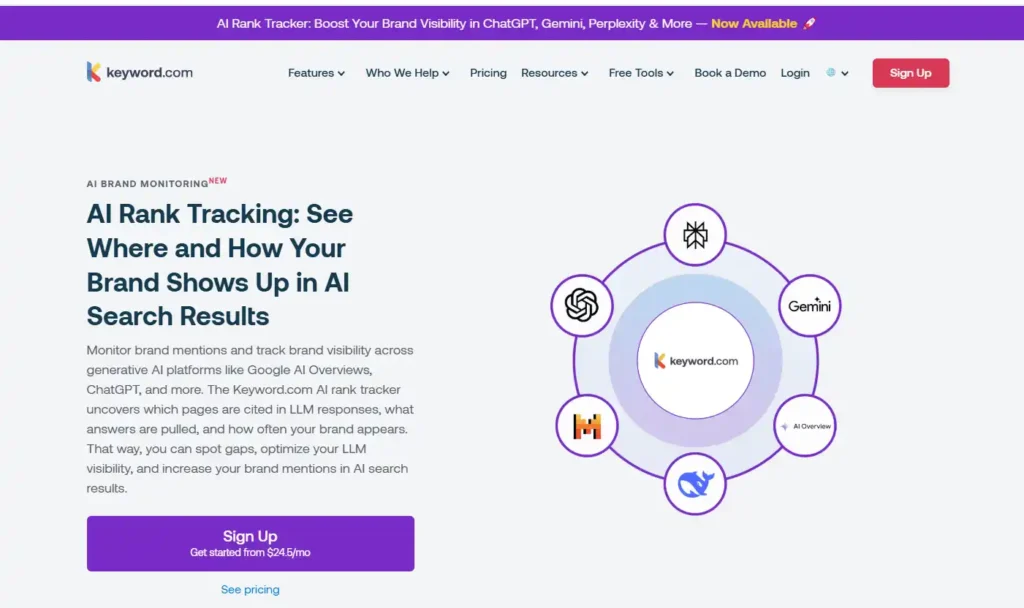
Best For: SEO agencies and in-house teams that need a reliable, all-in-one solution for both traditional SERP tracking and modern LLM monitoring.
Pros:
- A 14-day free trial is available.
- Tracks brand citations and sources across all major LLMs.
- Excellent for local and mobile SERP tracking alongside AI monitoring.
- Offers customizable, white-label dashboards and automated reporting for clients.
- Mature platform with a strong reputation for accuracy.
Cons:
- The user interface can feel dense for beginners.
- Advanced generative AI tracking features may require contacting sales for an enterprise plan.
Pricing:
- Starter: $24/month for 100 keywords.
- Business: Starts at $49/month with AI tracking features.
- Enterprise: Custom pricing for advanced AI monitoring needs.
6. Rankscale AI
Rankscale AI positions itself as a dedicated platform for AI Engine Optimization (AEO), focusing on helping your brand appear favorably in generative AI answers. It monitors your visibility across models like ChatGPT and Claude and conducts AI-focused site audits.
These audits go beyond standard technical SEO, identifying content gaps and structural issues that specifically impact how LLMs crawl and interpret your site. With competitive benchmarking and sentiment analysis, Rankscale provides a holistic view of your standing in AI-driven search.
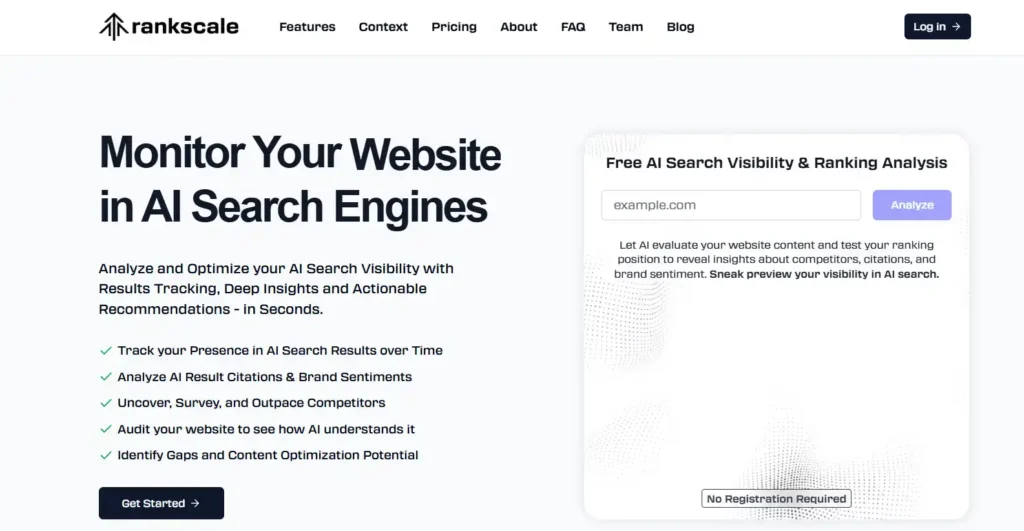
Best For: SEO and marketing teams looking for a specialized tool that provides AI-specific content and technical optimization recommendations.
Pros:
- Offers a free trial to test its features.
- Specializes in visibility within AI-generated answers.
- Unique AI-focused site audits offer actionable recommendations.
- Sentiment analysis helps you gauge brand perception in AI responses.
- Flexible credit-based pricing model.
Cons:
- Sentiment analysis is not included in the entry-level plan.
- Credit-based pricing can become unpredictable for heavy users.
Pricing:
- Essentials: $20/month for 120 credits.
- Pro: $99/month for 1,200 credits, including sentiment analysis.
7. Scrunch AI
Scrunch AI aims to close the gap between how AI perceives your brand and how you want it to be perceived. It tracks mentions and sentiment across LLMs and cross-references AI-generated answers with your actual content using a feature called the “Knowledge Hub.” This helps you spot and correct misinformation quickly.
Its standout feature is persona-based journey mapping, which illustrates how different user personas might encounter your brand through AI search at various stages of the buyer’s journey.
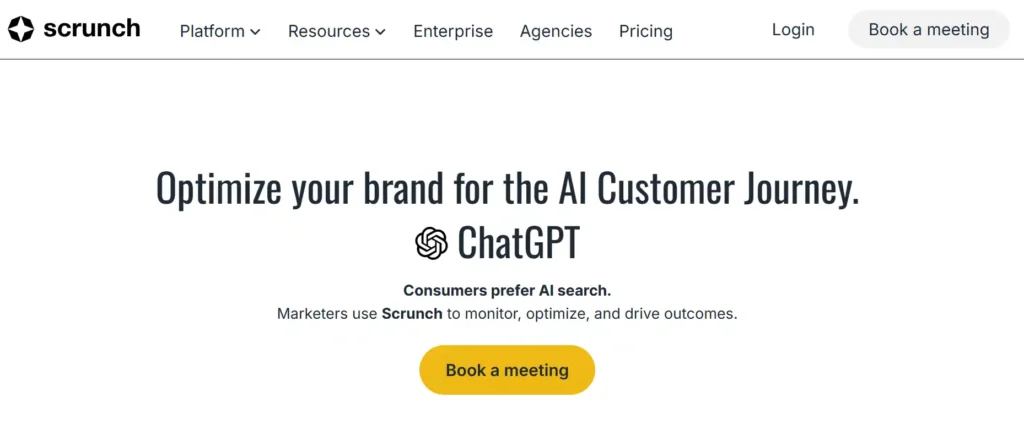
Best For: Brand strategists and marketing teams focused on narrative control and understanding the customer journey within AI search environments.
Pros:
- Specifically designed for AI-powered brand monitoring and narrative management.
- The “Knowledge Hub” feature is excellent for identifying and correcting AI inaccuracies.
- Persona-based journey mapping provides deep strategic insights.
- Offers real-time visibility into multiple LLMs, including Google AI Overviews.
Cons:
- No free plan or trial; requires booking a demo.
- The pricing is high, making it less accessible for smaller teams.
- The number of trackable prompts is limited relative to the price.
Pricing:
- Starter: $300/month for 350 custom prompts.
- Growth: $500/month for 700 custom prompts.
- Pro: $1,000/month for 1,200 custom prompts.
8. Otterly AI
Otterly AI is another dedicated AEO platform designed to track how your brand and content appear in AI search engines like ChatGPT, Perplexity, and Google’s AI Overviews.
It focuses on providing clear, actionable data for marketing teams. You can see which of your pages are being cited, the sentiment of the mentions, and how your visibility compares across different models and geographic locations. Its clean dashboards make it easy to digest complex data and generate reports.
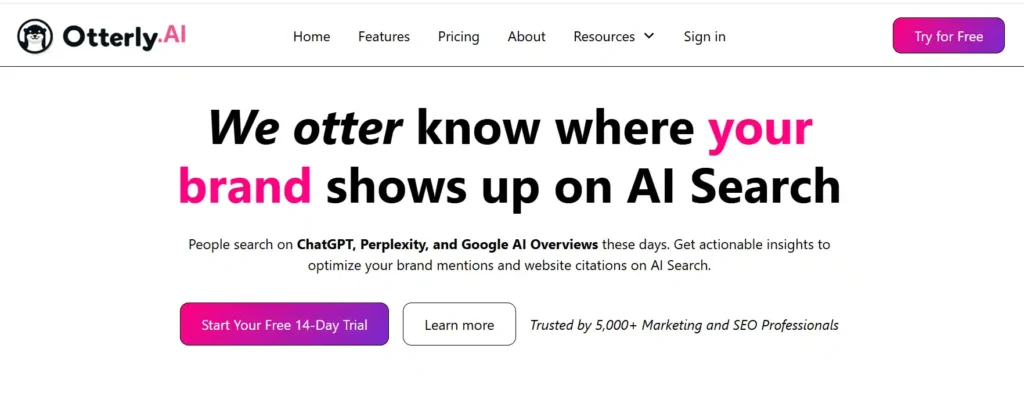
Best For: Marketers and SEO managers who need a user-friendly tool to monitor AI citations and brand reputation without a steep learning curve.
Pros:
- Offers a 14-day free trial.
- Purpose-built to monitor brand presence in AI-generated answers.
- Clean, intuitive dashboards and automated reporting.
- Tracks visibility across key platforms including ChatGPT, Perplexity, and AI Overviews.
- Supports geo-specific tracking for local or international campaigns.
Cons:
- As a newer tool, its documentation for advanced features is still developing.
- AI personalization means tracked results may not always perfectly match what every user sees.
Pricing:
- Lite: $29/month for 10 prompts.
- Standard: $189/month for 100 prompts.
- Pro: $989/month for 1,000 prompts.
9. Knowatoa AI
Knowatoa offers a clear value proposition: see how your brand is represented in AI before your customers do. It monitors your mentions and competitive positioning across ChatGPT, Gemini, Claude, and other major AI models.
A key feature is its ability to flag technical issues that might be hindering your AI visibility, such as robots.txt files blocking AI crawlers or crucial content being hidden behind paywalls. Knowatoa also alerts you if AI models are misrepresenting your products, allowing you to take corrective action.
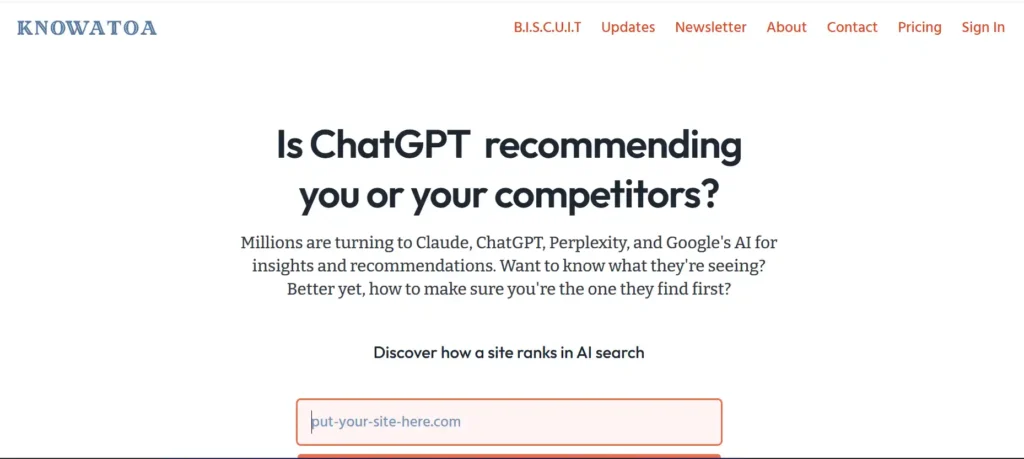
Best For: In-house marketing teams and agencies that need to monitor brand accuracy and identify technical barriers to AI visibility.
Pros:
- A free plan is available for basic monitoring.
- Covers all major AI platforms in its Pro and Agency plans.
- Excellent for identifying technical issues that block AI crawlers.
- Alerts you to product misrepresentations or outdated information.
- Familiar UI that is easy for SEO teams to adopt.
Cons:
- The free and premium plans are quite limited; tracking major LLMs requires the more expensive Pro plan.
- Lacks advanced features like sentiment analysis or deep user journey mapping.
- Still a newer player, so integrations are limited.
Pricing:
- Free Plan: Monitor up to 2 websites with limited queries.
- Premium Plan: $99/month for 2 websites (AI Overviews only).
- Pro Plan: $249/month for 15 websites (tracks all major LLMs).
- Agency Plan: $749/month for 50 websites.
10. SEOpital
SEOpital is primarily an AI-powered content creation platform, but it has recently introduced an LLM Tracking feature. This unique hybrid approach allows you to manage the full content lifecycle: from generating search-optimized articles to monitoring their performance in both traditional SERPs and AI answers.
The platform tracks your brand’s presence across ChatGPT, Perplexity, and Google AI Overviews. This makes it an interesting choice for content teams who want a unified workflow for creation and performance tracking.
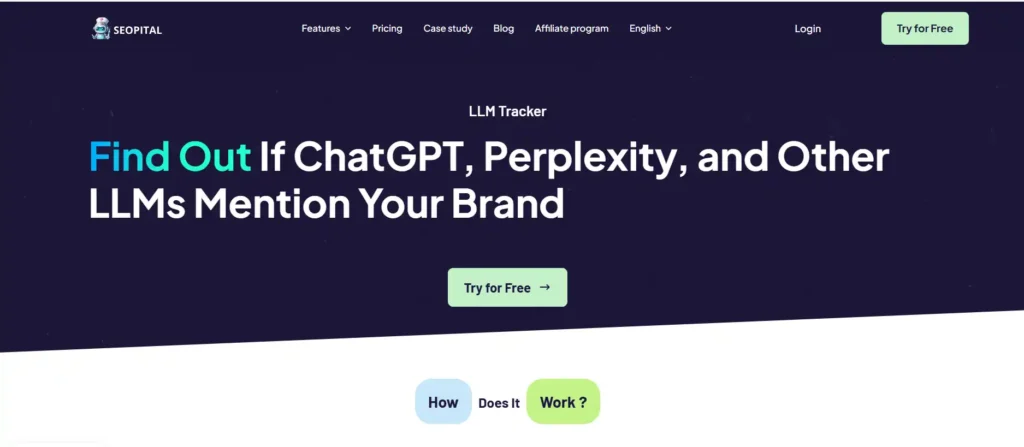
Best For: Content marketers and bloggers who want a single tool to create AI-optimized content and then track its visibility across both Google Search and AI models.
Pros:
- Combines AI writing, keyword research, and LLM tracking in one platform.
- Offers a free trial and flexible credit packs.
- Intuitive interface makes it easy to manage content workflows.
- Tracks mentions across key AI platforms relevant to content marketers.
Cons:
- The LLM tracking features are less comprehensive than specialized tools.
- Credit-based pricing can be restrictive for teams producing content at a high volume.
- Primarily a content tool, so its AEO analytics are not as deep as competitors.
Pricing:
- Basic: $49/month for 20 credits.
- Standard: $97/month for 50 credits.
- Expert: $149/month for 100 credits.
- Elite: $249/month for 200 credits.
Frequently Asked Questions
Can LLM tracking tools improve my rankings in ChatGPT or AI Overviews?
Yes, but indirectly. These tools show you which queries trigger your content and which pages get cited. By analyzing this data, you can optimize your content using clearer language, adding structured data, and improving E-E-A-T signals to increase its chances of being selected as a source by models like ChatGPT and Google’s Gemini.
Are LLM tracking tools just for developers?
Not at all. While some developer-focused “LLM observability” tools exist, the platforms on this list are built for marketers, SEOs, and brand managers. They focus on search visibility, brand mentions, and competitive insights, offering user-friendly dashboards that don’t require any coding knowledge.
Conclusion: Choosing the Right Tool for the AI Era
As generative AI becomes the new front door to the internet, understanding your brand’s presence within it is non-negotiable. The right LLM tracking tool provides the visibility you need to adapt your strategy, protect your brand reputation, and find new opportunities for growth.
For teams looking for an all-in-one solution that masterfully blends traditional SEO with next-generation AEO, SE Ranking and Keyword.com are excellent starting points. For those focused purely on brand management in AI, specialized tools like Peec AI and Profound offer deeper, more targeted insights.
Explore the free trials, book a few demos, and find the platform that aligns with your business goals. The sooner you start tracking, the bigger your advantage will be.



